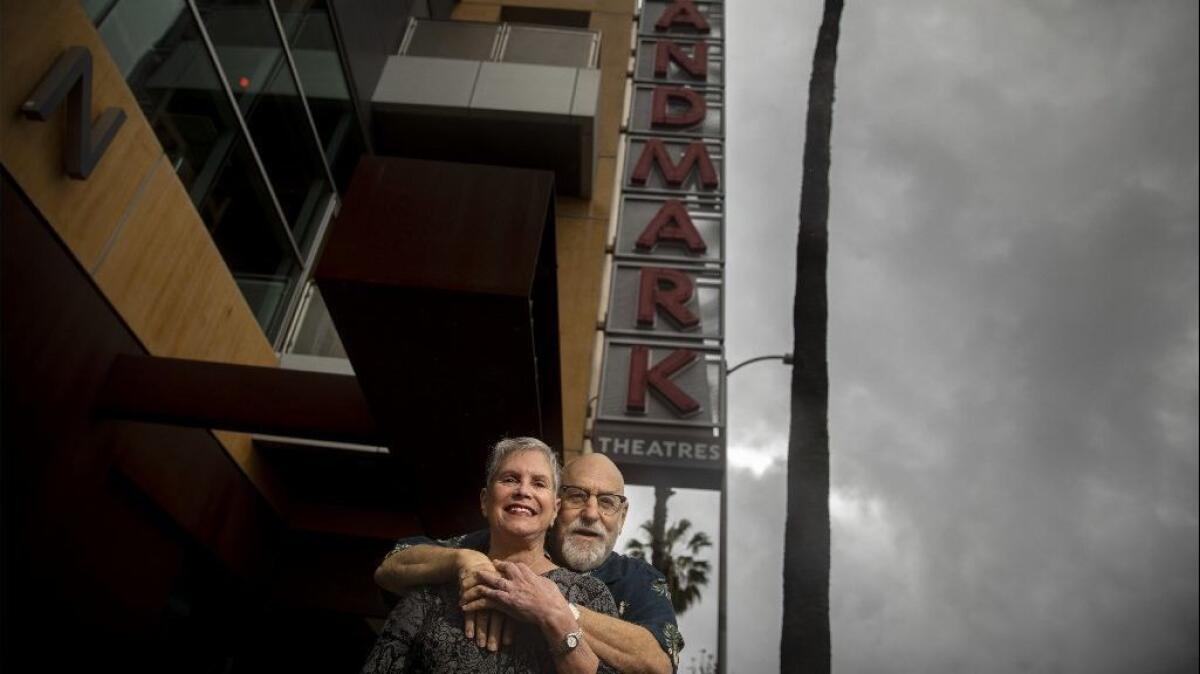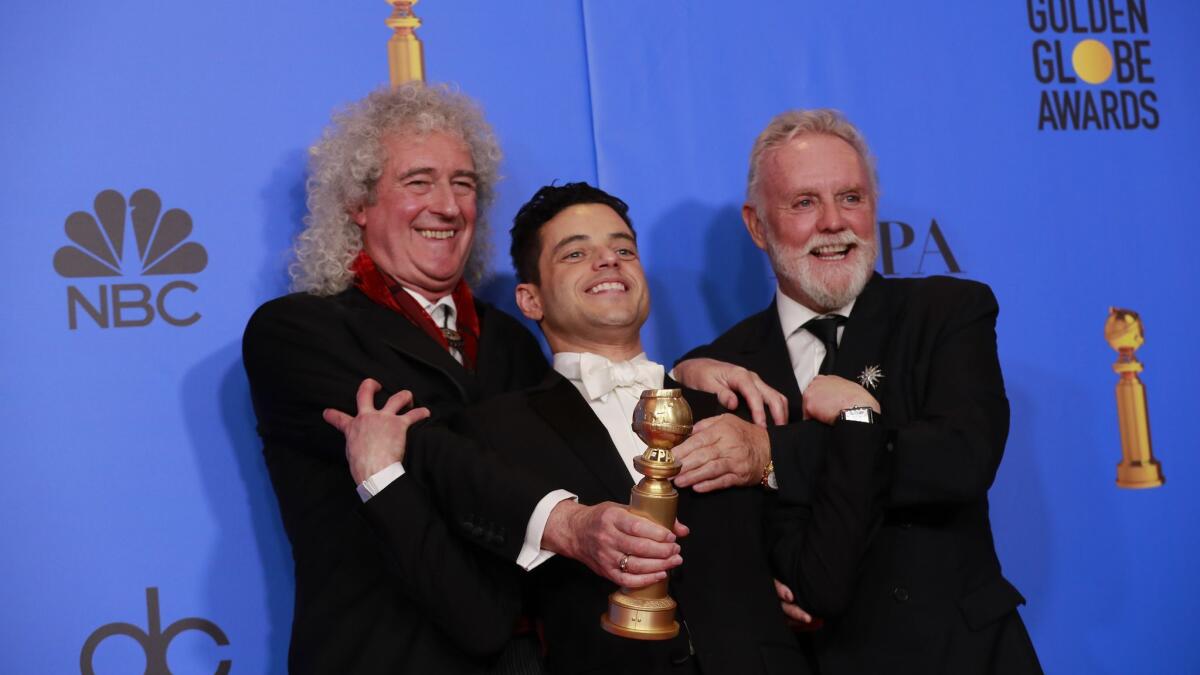This L.A. couple has seen ‘Bohemian Rhapsody’ 24 times: ‘It’s two hours of freedom’

Karin Dicker and Steven Sarott first saw “Bohemian Rhapsody” on Halloween night. When the credits rolled, Dicker turned to her husband of 22 years and said, “Let’s see it again.”
They did just that the following Saturday, and they’ve returned to theaters once or twice a week — 24 times as of President’s Day weekend — to watch the musical biopic of the rock band Queen and its charismatic frontman, Freddie Mercury, which earned five Oscar nominations, including nods for best picture and lead actor Rami Malek.
Neither Dicker nor Sarott, both 71, was a particularly big Queen fan before seeing the film.
“She didn’t know Queen from the King,” Sarott teases.
“Bohemian Rhapsody” resonated on a deeper level. Dicker is a double survivor of cancer. Sarott was diagnosed with acute myeloid leukemia six years ago and returned to the hospital for several weeks last summer after the cancer came back.
“This movie takes away the sad stuff going on,” Dicker says. “You sit in a theater and all that just disappears.”
“You can buy two hours of freedom,” adds Sarott, who still works full-time as an accountant.
Tucked away in a corner booth at the Westside Tavern, near the Landmark theater complex where they often have seen “Bohemian Rhapsody,” the Los Angeles couple shared how their connection to the movie has lightened their load these last few months.
FULL COVERAGE: Countdown to the 2019 Oscars »
Did you have any idea that you would become obsessed with this movie before you first saw it?
Sarott: A client went to Las Vegas in September and told me she was there to see Queen + Adam Lambert. I said, “Really?” She said, “Yes, I’m seeing two shows a night for 10 straight days.” So I think that intrigued Karin.
Dicker: Seeing the movie was my introduction to Queen. I didn’t know the band or Live Aid or when Freddie Mercury died. I bought the greatest hits CD and the movie soundtrack and I play it and it goes through my head even when I’m not listening to it.
Sarott: She has her own jukebox in her head.
Dicker: And it’s playing “Love of My Life” and “Bohemian Rhapsody.”
Are those your favorite Queen songs?
Dicker: “These Are the Days of Our Lives,” the song Freddie’s singing when he’s frail, is probably my favorite.
Sarott: I like “Hammer to Fall.” It’s got a little more beat to it. Also “I Want It All.” I love that one. But in the movie, I like how they used “Who Wants to Live Forever” when he’s going to the hospital. It sets the perfect mood.
Do you think your own recent health issues have made the movie resonate more deeply?
Sarott: Yes. I wondered if Freddie felt the same as I did when the doctor gave him the news that you’re not immortal anymore and the body clock is counting down with a limited amount of ticks left.
When I got the news that I had AML, it was like I got kicked in the stomach. I thought I was invincible. In my heyday, I could jump rope 31 minutes without a break. I get this diagnosis and I told my doctor, “Wait. I was just at the health club last night lifting weights.” It was so out of the world. He wanted me to go into the hospital the next day. I said, “It’s tax season. I don’t have time for this disease.”
But you know, I’m still here. I thought I was dead six years ago. Now I’m playing with house money.
Dicker: This movie takes us away from reality just long enough. And it goes by so fast. We’ve never looked at our watches once in the theater.
Sarott: Last week, we went and there was an elderly lady next to me — “elderly” meaning older than I am because I’m old. And I told her I’d be curious to hear how she liked it …
Dicker: She thought it was a symphony.
At this moment, Queen’s “Fat Bottomed Girls” begins playing in the restaurant. Sarott laughs. “There’s no escape,” he says.
Why do you think there’s such a divide between moviegoers and critics on this movie?
Dicker: I don’t know what angle the critics are approaching it from. Maybe the magic of movies is not the same for them.
Sarott: They’re pointing out that the movie doesn’t follow the real events. I don’t care. I know Freddie Mercury didn’t have AIDS when he did the Live Aid concert, but the way the film framed that worked for me. And we didn’t know about the director [Bryan Singer, who has faced allegations of sexual misconduct] until people started writing about it after the Golden Globes.
Dicker: When Rami won the Golden Globe, I was tearful. It was like my son won.

Oscars: Watch the key scenes that helped Rami Malek and the other stars land nominations »
So you’re fully invested in watching the Oscars then?
Dicker: God, yeah. Absolutely. I’m telling you, he’s just like my kid. When he wins awards, I am so proud of him. He’s my Freddie Mercury.
What are you going to do after the Oscars when the movie leaves theaters?
Dicker: We already have the DVD. It arrived the day it came out.
Sarott: And of course we watched it right away. We sound like nutcases, don’t we?
Dicker: We’re not. It’s just that this movie has helped us get through some sad times. It suspends reality.
Sarott: Seeing it is an experience. Watching that Live Aid concert, it’s so exhilarating, I still get moved to tears.
Twitter: @glennwhipp
More to Read
Only good movies
Get the Indie Focus newsletter, Mark Olsen's weekly guide to the world of cinema.
You may occasionally receive promotional content from the Los Angeles Times.










